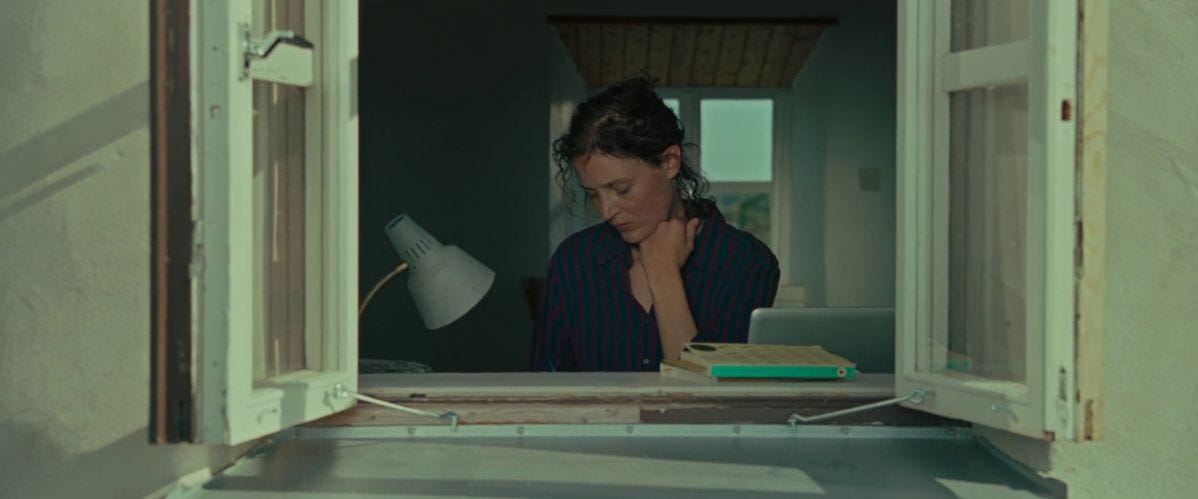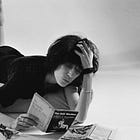Foreword
In June, I wrote about presenting an emergent version of the questions guiding my second dissertation chapter at the ACLA (American Comparative Literature Association) conference. Since then, I’ve had a very efficient summer of fleshing out these ideas more thoroughly, finishing a draft of the chapter in half the time it took to do the first one. This is in large part thanks to new strategies, chief among which has been not parsing writing from reading. Whereas for chapter 1, I read 20 or 30 books up front and then opened the document, I read and wrote concurrently (I actually started with writing a little intro) and this helped me see what material I actually needed to consult and why or how. Game changer! The below documents some of the thoughts on writing I had while working on this.
Speaking of ACLA, I’ve proposed another seminar for their next conference in Montréal this February in celebration of Sara Ahmed’s Queer Phenomenology and its 20th anniversary. If you are a grad student or professor and this book speaks to you and your research, please apply! The deadline is Oct 2.
Related posts:
July 30
It’s the end of July and I have about 15 pages of my second chapter thoroughly written out.
For chapter 1, I front-loaded all of my reading and by the time I got to opening the document, I had an overwhelming repertoire of theory to untangle. It felt insurmountable. This time, I am doing things more concurrently—a week or two of reading, then one of writing, sometimes with crossover. I’m finding it to be much more fluid since I have a better sense of what I actually need to research and what probably won’t make the cut. Then, to create continuity between the two chapters, I’m also always flagging the ways in which this chapter builds on or differs from the last—for instance, since I’m writing a lot about race, gender, and crime photography, I can briefly refer back to my earlier work on Ana Mendieta and her subversion of crime scene imagery in the performance Rape Scene, which I had analysed at length. Since a lot of my chapters take up fairly different issues and texts, I want to make sure I’m being very deliberate about clearly marking the threads that do string them together.
When August arrives, I’ll commit more time to writing—I want to reach 60% of a solid draft before the new academic year arrives.
August 18
An update—I was doing a lot of info-dumping in my first body section of the chapter, which deals with triangulating the innovation of photography with both slavery and criminology. I’m losing sight of the project as a whole and of my primary literary/visual texts for this chapter, so I need to recalibrate.
I do this by making a little chart where for each subsection of the chapter, I draft a title, list the primary textual evidence I want to foreground, list a few bullet points on the key theoretical references that need to be tended to, and then draft a few arguments or questions that are being staked in that section. This is a helpful way to simplify and scaffold the essentials.
Speaking of scaffolding, I also maintain a useful document where I keep what I call template skeletons, kind of like Mad Libs for filling in how to structure certain kinds of argumentative paragraphs, especially those where multiple sources are coming into conversation with one another and things can get unruly. Having these to plop in (with much flexibility) helps such moments become more manageable and reminds me of what beats I need to hit. Example:
[Group] like [author] have long provided answers/analysis/critiques of ____, mobilising [form/aesthetics/vocabularies/strategies of ____] toward ____ imaginaries. In [primary text], [author] accounts for how ____ are central to ____ possibilities/relationalities/socialities. As I/author have indicated at [earlier point], this comes in the mode of ___, a vision of ____ that is ____. This is likewise true of ____, which works to ____. This affirms my finding that ____ offers us ____ and sustains/enables the potential for ____. By [moment in text, gesture of author, trajectory of my work], we can see how what [scholar] calls “____” permeates the event/setting/body/character/narrative, producing/yielding/generating ____.
I’ve more or less made it through the photography/history groundwork now, and will move on soon to another section linking this to Hortense Spillers’ thinking about gender, body/flesh, and agency.
August 20
Ok, the photographic history section seems to be pretty fleshed out now, so before I wrap up for the day, I’m leaving a little outline of thoughts for the next chunk. I always try to end each day with a roadmap for the next, so that I’m not starting from zero and having to spend most of my writing time re-reading and re-calibrating.
I think my strategy for digging into Spillers’ connections to the chapter is going to be twofold: 1) I have really good notes on her collection Black, White, and in Colour from when I did my Special Fields exam, so I’ll be able to weave much that précis directly into the body of the dissertation. 2) I’ll treat this section as a bit of a close-reading of Spillers—what is she saying in “Mama’s Baby, Papa’s Maybe” that chimes with what I’ve been saying about Shakur and Simpson (my primary texts) and how do they reveal potentially new textures in her essay?
To accomplish this, I’ve pasted my précis into the document and added marginal comments with moments I want to zero in on and connect to my project. I think this will set me up well structurally: I’ve got an anchor in Spillers that I can follow with interjections from the literary/artistic works.
August 23
Yes—I think this section is working better because I’m doing a lot of close-reading, but also because I’m doing what I like to do best, which is using literature to read and think through theory. Typically, English courses teach us to go the other way around, but for whatever reason that’s less interesting to me (I guess I want to land an argument about concepts or ‘the world’ and less so about a text—I’m going in an unorthodox direction but one I do feel is more interesting). In any case, this section on Spillers and flesh feels very coherent and illuminating (at least while I’m working on it—ask me again in a few weeks, lol) because I think it both has a central spine and is letting me work in this particular mode.
I’ve also just started Jasbir Puar’s The Right to Maim which is adding some useful vocabulary for this section—I’m putting her ideas about maiming and debility into conversation with Spillers’ term ‘flesh’ and Assata Shakur’s (physical and representational) abuse by police and prison guards. Also useful for thinking about gesture—my central interest—not as a sign of the wilful capacity or expression of the liberal subject, but as something that complicates self-mastery in ways coordinated with disability frameworks.
It’s also interesting how many things from the last chapter are unexpectedly popping up as relevant to this one: things like performances of vulnerability before the law or the uneven practices and ethics of self-defense. I love realizing there are threads in my work or preoccupations that I didn’t know I had.
My goal was to be 60% through a draft by the end of the month, but I think if I get 1-2 hours of straight writing in everyday, I could get up to 80%…. dare I say it… even 100% (minus a few citations I’ve left blank spots for—I’ve got to return to Foucault and a few other guys but I know roughly where and how I’ll use them). I also know I’ll have to tweak the intro because I think the emphasis has fallen in some other places I hadn’t initially intended, but I don’t anticipate that being a massive job yet.
August 24
It is Sunday and I am trying to move through the world with unparalleled calm. On my desk for an hour or so of writing, I have: green tea in a favourite mug, a slice of banana bread baked by my mom, water bottle, bullet journal open to today’s to-do list, TV remote, iPad, laptop, phone, training treats for the dog, a stack of books to reference (Angela Davis, Scenes of Subjection, Queer Phenomenology). I have a Diana Lopez “forest frequencies” video playing softly on the TV and so far this morning I’ve gone for a walk, had breakfast, done yoga, dry brushed, washed my hair, and tidied a few things around the house. A good way to start.
Things go well today and I feel so excited about some of the synthesis and summary I’ve managed to do as I head into the final section. But writing isn’t pure ease: in particular, while I write I experience physical pain from chronic tendinitis. I keep essential oils and muscle creams within reach and today I need them. I think of one of my favourite essays by Claire-Louise Bennett:
Writing when I am in pain feels painful and is the opposite of what I want and am able to do. When I am in pain I find it impossible to take hold of the pen. My grip is poor. When I am in pain I can’t stand to be aware of my hands. They hang about my face, as if my face were a tree they want to roost in. Writing involves touching, and extending, and when I am in pain I don’t want to touch or extend; I don’t have it in me because I am in pain and therefore I am clenched rigid.
It doesn’t stop or slow or frustrate me today, but it can. It’s easy for me to forget that writing is labour sometimes because I feel lucky to do something that I find pleasurable even when challenging, but it is exhausting both mentally and at certain times, physically. I deserve rest! We all do!
August 30
I’m through a whole draft—yes!! In only four months! I have to go back through and revise some more to see if my introduction actually mates up with what I ended up writing, but since my goal had been to reach 60% by the end of August, I’m chuffed to have exceeded expectations.
August 31
Revising today. I keep a checklist towards the end of editing a draft to remind me of the things I want to come back to: for instance, I’ve paraphrased quotes from Fanon and Spillers and need to get the real ones with page numbers. I also have a close reading floating in the marginal comments that is good (I think) and needs to find a home somewhere here.
I also know that once I send this to my supervisor for her initial round of feedback, I’ll want to read a little more: all of Foucault’s Discipline & Punish, some Ruth Wilson Gilmore, some more Black performance studies works. This is another checklist and I’ll take some time this week to put together a schedule and break down which books I’ll read when.
Since this marks the end of Part I, I’m also reflecting on the overall arc of the dissertation so far and how the two chapters in this part speak to one another. Some of this reflection is happening in the conclusion I wrote yesterday—looking back and looking ahead—but I also want to go back and do some more global revisions now that both chapters are more or less set. For instance, my supervisor suggested I dig more into Merleau-Ponty for Chapter 1, and so I’m thinking of doing a little independent study with The Phenomenology of Perception over the winter and having more of a phenomenological outlook to the dissertation. The plan is looking like this right now: first, extra reading for this chapter, then initial revisions, then meeting with the committee for feedback on a more final draft, then a little phenomenology side quest, and then starting chapter 3. Hoping this works out as a nice orientation for the academic year.
September 7
At my parents’ house, I printed out both chapter drafts and re-read them. I haven’t looked at chapter 1 since May, and I was struck by the lucidity of the introduction (which I rewrote probably 10 times). It succeeds at being very clear about the stakes, territory, questions, and arguments to come, so I want to go back to this new chapter and look at how I can repeat something like this in this intro as well. I think this makes sense both structurally (to have some kind of congruence) as well as to keep practising as a writer.
The last thing I’ll mention is that I’ve been put onto the podcast by the Keywords Feminist Editorial Collective and listening to their short episodes in discussion of a key concept in gender and sexuality studies is a great little reminder of the theoretical territory I should make sure I’ve covered. Here’s the link to the show as well as the book on which it is based.
What I’m Writing
Seeking (paid) homes for three November book reviews!
Revising chapter 2 of the dissertation.
Fiddling with going back to my Aftersun article, which has been neglected for a while now.
What I’m Reading
I loved this conversation with Judith Butler in TLS, especially their comments about writing (relevant to this dispatch!): “A great deal surprises me in what I write. I don’t actually arrive at a thought until I have circled around what I think it is. And then something emerges from that circling that I did not fully know in advance. I have a kind of trust in the process, that the thought will emerge in the course of writing. And for me, this happens more in writing than in saying, which feels more like a rudder gone awry, although sometimes I get lucky there. These are all questions that Kleist anticipated with his astonishing essay, published in 1805: “The gradual construction of thought through speech” (Über die allmähliche Verfertigung der Gedanken beim Reden).”
Finished East of Eden this week. What a majestic book! It seems to me a powerful gesture of forgiveness, extended generously both to the characters (so meticulously crafted) and the reader themself. I was told to watch out for the iconic line “And now that you don't have to be perfect, you can be good,” but encountering it within the book was something else entirely. There is a collection on Reddit of “god-tier” quotes from the novel, though I suggest you just read it as they are far more impactful (and often surprising) in context.
Beginning Omar El Akkad’s One Day, Everyone Will Have Always Been Against This.
My reading group will be starting Emma Heaney’s edited volume Feminism Against Cisness soon.
Other
Listening to Haim (saw their concert on September 6 here in Toronto) and Jazzie Young:
Practising “Save Money September” by trying to eat cheap and not impulse buy.
A few docs and series are on my radar and I’ll be seeing two films at TIFF this week.








Tia this is so inspiring! i'm gearing up for fall quarter over here and have been searching desperately for more inspo and motivation to help me romanticize the school year and plow through diss writing. and reading your writing diary helps, so thank you. also where can we find more academic mad libs bc wow that's so helpful?